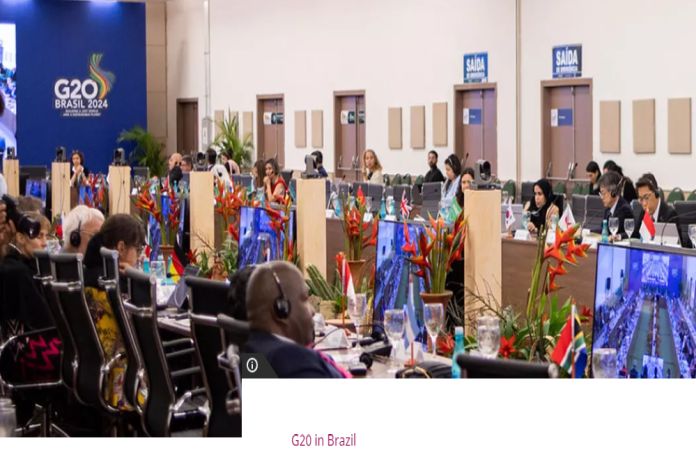- New commitments to strengthen the Equal Pay International Coalition (EPIC) and the campaign for equal pay for women and men were made on the sidelines of July’s G20 meetings in Brazil.
BRAZIL (ILO News) – Chile and Turkey have committed to joining the Equal Pay International Coalition (EPIC) and two more countries have agreed to increase efforts to close their national gender pay gaps.
By joining EPIC, the two countries bring the number of governments who have signed up to EPIC’s goal of equal pay for women and men to 27. In addition, Spain – which is already an EPIC member – and Japan have agreed to do more to support EPIC’s target.
In total, EPIC currently has 63 members, drawn from employers’ and workers’ organizations, international bodies, academia and civil society, as well as governments.
The new commitments came at an event hosted by EPIC and the Brazilian government, during G20 meetings in Fortaleza, Brazil, in July. Brazil, which currently holds the presidency of the G20, has identified gender equality and the promotion of diversity in the workplace as key priorities for the G20 Employment Working Group (EWG).
The event, Together Let’s Close the Gender Pay Gap NOW, was organized by EPIC, in collaboration with the Brazilian Ministry of Labour and Employment (MTE). The aim was to accelerate progress toward achieving Target 8.5 of the Sustainable Development Goals (SDGs) and highlight how equal pay for work of equal value strengthens the ability of countries to achieve the other SDGs, thereby reducing hunger, poverty, and inequality.
Delegates discussed the complex challenges that pay inequalities between men and women represent, and shared experiences and best practices on closing the gender gap and promoting pay equity in the world of work. Pay discrimination, based on gender, ethnic and racial inequalities, along with the disproportionate amount of unpaid care work shouldered by women and their exposure to violence and harassment at work, are the main factors hindering women’s access to labour markets.
The chief of the International Labour Organization’s Gender, Equality, Diversity, and Inclusion Branch, Chidi King, moderated the discussion, which featured opening remarks by the Brazilian minister of labour and employment, Luiz Marinho, and a keynote address by the Brazilian national secretary of care economy and women’s autonomy of the ministry of women, Rosane Silva.
In her remarks, King highlighted that despite significant progress in gender equality policies and actions, equal pay remains elusive. “Around the world, women earn less than 80 cents for every dollar that men earn. For women with children, women of colour, women refugees and migrants, women with disabilities, indigenous women, and many others, especially those in the informal economy, that figure is even lower. It is for these reasons that, over recent years, many countries have introduced new legislation with the aim of closing the gender pay gap. However, despite these efforts, no country has yet managed to achieve this goal in its entirety,” she said.
Secretary Silva shared Brazil’s experience in drafting the Equal Pay Law, which, among other measures, established a Working Group to develop actions for advancing wage and employment equality. She also highlighted the creation of the Inter-ministerial Working Group (IWG), which is tasked with drafting the National Care Policy and to which the ILO provides technical guidance.
Representatives from Brazil, Canada, the United States, the International Organization of Employers, and the International Trade Union Confederation also participated in the discussion, sharing their experiences and challenges in reducing gender-based income inequality.
Officials from the governments of Chile and Turkey expressed their countries’ commitment to joining EPIC, while Japan and Spain outlined specific measures that their countries will implement to reduce the national gender pay gap.
ILO deputy director-general, Celeste Drake; interim representative for Brazil at UN Women, Ana Carolina Querino; and OECD deputy secretary-general, Yoshiki Takeuchi, spoke at the closure of the event and shared their reflections on the remaining opportunities and challenges ahead.
“We have a collective responsibility to close the gender pay gap: to make it visible, measure it, find innovative and practical solutions to address it, and accelerate progress towards the Sustainable Development Goal Target 8.5.,” said Drake.
EPIC
EPIC (Equal Pay International Coalition) is co-led by the ILO, UN Women and the Organization for Economic Cooperation and Development (OECD).
EPIC operates at global, regional, and national levels to support governments, employers, workers and their organizations, the private sector, civil society, and academia in taking concrete steps to eliminate the gender pay gap and achieve equal pay. EPIC also assists in improving legislation, building capacity, and strengthening monitoring and enforcement mechanisms.
Aligned with the 2030 Agenda, EPIC aims for the universal ratification of the ILO Equal Remuneration Convention, 1951 (No. 100), and seeks visible efforts and results from governments and the private sector in implementing equal pay initiatives.





